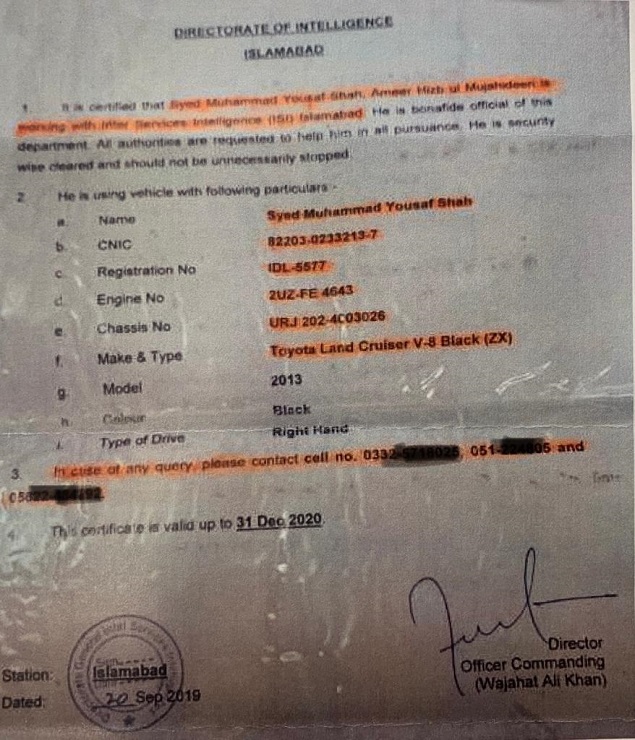NEW DELHI: In a breakthrough for their efforts to nail Pakistan's state agencies to their “proxies” fomenting terror in Jammu & Kashmir, the Indian security establishment has got its hands on a recent document issued by the Directorate of Intelligence, Islamabad “certifying” Syed Muhammad Yousaf Shah alias Syed Salahuddin, head of banned terrorist group Hizbul Mujahideen, as its “bona fide official” who is “working with ISI”.
The letter, issued in the name of director/commanding officer Wajahat Ali Khan, states that “it is certified that Syed Muhammad Yousaf Shah, Ameer Hizbul Mujahideen, is working with Inter Services Intelligence (ISI), Islamabad. He is bona fide official of this department”. Sharing details of the vehicle used by Salahuddin, the letter instructs that “he is security-wise cleared and should not be unnecessarily stopped”.
This certificate, a copy of which has been accessed by TOI, is valid up to December 31, 2020
Salahuddin, apart from leading Hizbul Mujahideen, a designated terror outfit in the US and India, also heads United Jihad Council (UJC), an umbrella body of terror outfits including the UNSC-proscribed Lasker-e-Toiba and Jaish-e-Mohammad. He had admitted in an interview in 2012 to “fighting Pakistan’s war in Kashmir”.
On Saturday, Indian Army officials, at a press conference in Baramulla (J&K), said Hizbul Mujahideen was trying to re-establish its base in north Kashmir.
Indian agencies are overjoyed over what they call "clear evidence of "ISI's ties with banned terror outfits responsible for several attacks in India” and feel that the revelation will strengthen the case for moving Pakistan to the Financial Action Task Force (FATF) ‘blacklist’. Pakistan which is currently on the FATF ‘grey list’, was in February given a four-month window to deliver on the 27-point Action Plan to curb terror financing and money laundering. This deadline was extended because of the pandemic and the next review is due on September 14, followed by FATF plenary in October.
The success of Indian security agencies also shows that the so-called anti-terror measures Pakistan recently took under tremendous pressure were a deception aimed at averting financial sanctions in FATF. The dodge included approval of some FATF-related legislations and issuance of Statutory Regulatory Order (SRO, (Aug 18) that ostensibly puts restrictions on 88 individuals and entities affiliated with extremist groups under the UNSC sanctions. Pakistan is estimated to be sheltering around 130 UNSC-sanctioned terrorists.
Significantly, next FATF review of Pakistan’s status comes against the backdrop of the bank trail unearthed by NIA of money transfers made by Pakistan-based Jaish operatives to a key perpetrator of the February 2019 Pulwama terror attack that killed 40 CRPF personnel.
Also a charge-sheet was filed by ED against Salahuddin and 11 others in a terror financing case. ED has also sought confiscation of HM’s attached assets.
As reported earlier by TOI, NIA charge-sheet filed last month cites deposit slips for five cash transfers, totalling Rs 10 lakh, made by Jaish into accused Mohammad Umar Farooq’s two bank accounts in Allied Bank, Khyber Agency and Meezan Bank, Peshawar, days before the attack. Of this, Rs 5 lakh were dispatched to Kashmir through the hawala route and used for making the car bomb. An officer here said the bank trail found by NIA establishes how Pakistan’s banking system was complicit in funding the perpetrators.
China has been the main backer of Pakistan in FATF. As three votes are required at FATF to prevent blacklisting, Beijing, in cahoots with Malaysia and Turkey, has been blocking Pakistan’s blacklisting. One of the key agenda of Pakistan Foreign Minister Shah Mehmood Qureshi’s recent visit to Beijing was to seek China’s support ahead of the FATF review.
However, with Pakistan's links with terror outfits coming again under international glare, China may be required to step up its effort to save it.
Pakistan is under international heat with US is probing the role of Pakistani nationals in Islamic State (IS)-linked activities in Syria. US-backed Kurd Democratic Forces (KDF) reportedly handed over a list of 29 Pakistanis who it is holding captive and who were fighting for IS in Syria.
Germany recently turned down a Pakistani request for supply of German Air Independent Propulsion (AIP) system for its submarines.
Pakistan is actively engaged in supporting terrorist outfits in Afghanistan. In March 2020, ISI in collaboration with its proxies— Haqqani Network and LeT—- carried out a terror attack on a Sikh Gurudwara in Kabul, killing 28 people.
Pakistan also has alleged links with terror groups Jamaat Ansarullah in Tajikistan, The Islamic Movement of Uzbekistan and East Turkistan Islamic Movement in China, that it uses as leverage to seek quid pro quo with these countries, forcing them to go soft on its links to terror.
Salahuddin supports terrorist activities on Indian soil through proxy NGOs and charities supported by Pakistan’s ISI. Most prominent is the Jammu and Kashmir Affectees Relief Trust (JKART), with its head office in Rawalpindi and branches in Islamabad and Muzaffarabad (PoK), etc.




